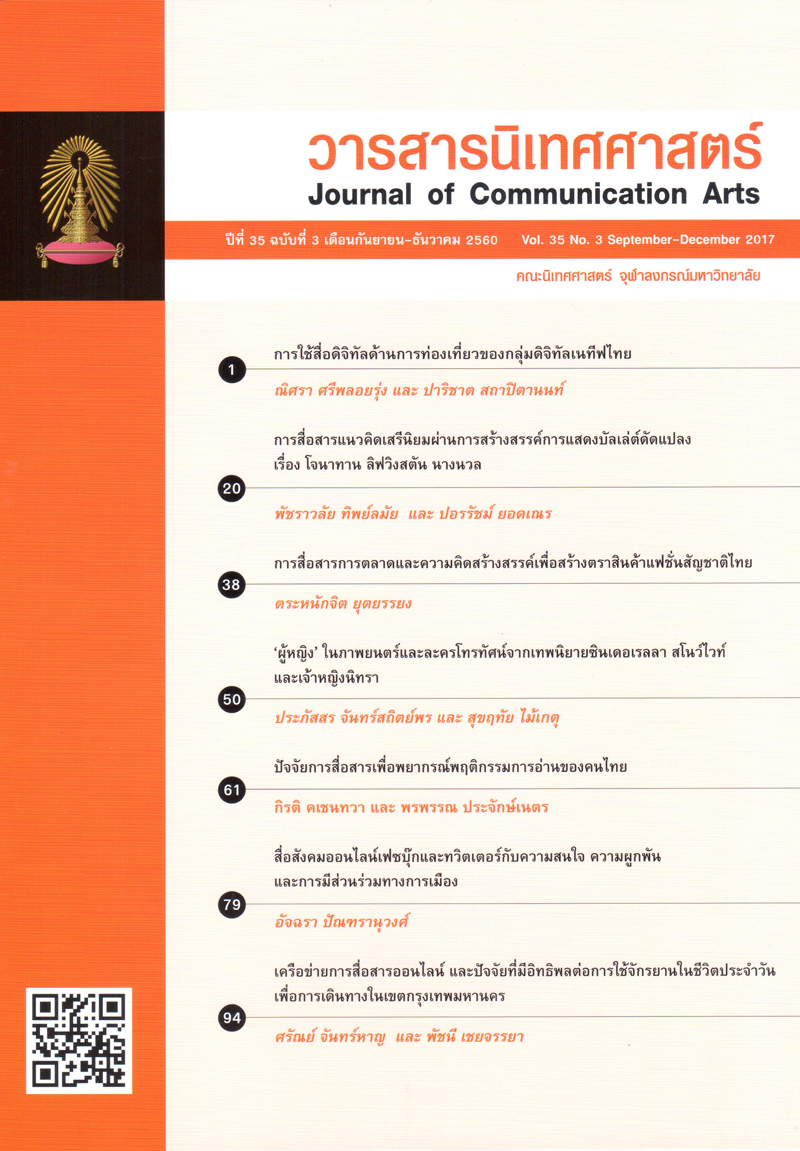สื่อสังคมออนไลน์เฟซบุ๊กและทวิตเตอร์กับความสนใจ ความผูกพัน และการมีส่วนร่วมทางการเมือง
Main Article Content
Abstract
The present study entitled Selective Exposure to Political Messages, Political Interest, Affiliation, and Participation on Facebook and Twitter Social Network Media is a quantitative study using cross-sectional survey method. A total of 400 samples were drawn from Facebook and Twitter users, with questionnaire as tool of data collection. Respondents were recruited through both online sources and face-to-face interviews in Bangkok, its parameters and in large urban areas in the provincial regions.
Findings indicate that most Facebook and Twitter followers used these media to keep them informed of political movements. Facebook pages most visited were Voice TV and Nation TV 22,
while Twitter account of the National Council for Peace and Order (NCPO) was followed most by respondents. Most respondents showed high level of interest in political issues. However, relatively low level of political affiliation was identified among respondents. Similarly, political participation was also found to be low in both online and offline activities.
Data analysis also reveals statistically significant association between gender, education, and place of living, with selective exposure to political messages on online media. Selective exposure to political messages was found to be related to political interest as people following different Facebook pages and Twitter accounts tend to have different kinds of political interest as well. Political interest is positively correlated with political affiliation, which in turn, is positively correlated with political participation. Interestingly, political participation on online media was found to have higher level of correlation with political affiliation than offline participation.
The findings are also supportive of Theory of Cognitive Dissonance in that people tend to expose themselves to political messages that are consistent with their own political beliefs and opinion.
Article Details
References
กมลวรรณ คารมปราชญ์. (2550). การศึกษาอิทธิพลของการถ่ายทอดทางการเมืองจากครอบครัวสถาบันการศึกษา ที่ทำงาน และสื่อมวลชน ที่ส่งผลต่อความโน้มเอียงทางการเมือง ความผูกพันต่อพรรคการเมือง และพฤติกรรมการมีส่วนร่วมทางการเมืองของพนักงานรัฐวิสาหกิจ.วิทยานิพนธ์วิทยาศาสตรดุษฎีบัณฑิต, มหาวิทยาลัยศรีนครินทรวิโรฒ, สถาบันวิจัยพฤติกรรมศาสตร์.
วัลลภ ลำพาย. (2535). ความรู้สึกสัมฤทธิผลทางการเมืองและความสนใจทางการเมืองของข้าราชการไทย: ศึกษาเฉพาะกรณีข้าราชการ กรมส่งเสริมสหกรณ์ส่วนกลาง. วิทยานิพนธ์รัฐศาสตรมหาบัณฑิต, มหาวิทยาลัยธรรมศาสตร์, คณะรัฐศาสตร์.
วรรณวิภางค์ มานะโชติพงษ์. (2557). “มองเหลือง-แดง ผ่านขั้วความทางการเมือง”, วารสารเศรษฐศาสตร์ ธรรมศาสตร์. 32:3 “ชี้โลกออนไลน์ เหยื่อสังคมการเมือง” (20 ธันวาคม 2558). สืบค้นจากhttps://www.thairath.co.th/content/87154
สมบัติ ธำรงธัญวงศ์. (2551). ปัจจัยภูมิหลัง วัฒนธรรมทางการเมือง และการมีส่วนร่วมทางการเมืองของผู้นำเยาวชนไทย. งานวิจัย คณะรัฐประศาสนศาสตร์ สถาบันบัณฑิตพัฒนบริหารศาสตร์ สมาคมโฆษณาดิจิทัล (ประเทศไทย). (30 ธันวาคม 2558). “Thailand Social Media Landscape 2014”. สืบค้นจาก http://www.daat.in.th/index.php/thailand-social-media-landscape-2014
ภาษาอังกฤษ
An, Jisun&Quercia, Daniele & Crowcroft, Jon. (2013). Fragmented social media: A look into selective exposure to political news. WWW 2013 Companion - Proceedings of the 22nd International Conference on World Wide Web. 51-52.10.1145/2487788.2487807.
Arnstein, S.R., (July, 1969). “A Ladder of Citizen Participation.”Journal of the American Planning Association. 35tein
Dahl, R.A. (1961). Who Governs?. New Haven, CT: Yale University Press.
de Bastion, G., Stilz, M. and Herlitz, R. (2014). Social Media and Political Participation. Eschborn: the Deutsche GesellschaftfürInternationaleZusamenarbeitde
Harmon-Jones, E. (2009). Cognitive Theories.In Littlejohn, S. W. & Foss, K. A. (Eds.), Encyclopedia of Communication Theory. (pp.109-111). Thousand Oaks, CA : SAGE.
Holleque, M. (4 August 2011). “Rethinking the Stability of Political Interest” (Draft).A Meeting of the University of Winconsin’s Political Research Group.
Klapper, J. T. (1960). The Effects of Mass Communication. New York: The Free Press.
Laopanarai, P. (2012). Facebook and Political Awareness of Multi-color Shirt (Movement): A Case Study of Political Movement during April-May 2010. Thesis (M.A. (International Relations), Thammasat University, Faculty of Political Science.
Meijer, A., Burger, N., & Ebbers, W. E. (2009). “Citizens4Citizens: Mapping Participatory Practices on the Internet.”Electronic journal of e-Government, 7(1), 99-112.
Messing, S. & Westwood, S.J. (2012). Selective Exposure in the Age of Social Media: Endorsements Trump Partisan Source Affiliation When Selecting News Online. Retrieved 3 December 2015 from http://www.dartmouth.edu/~seanjwestwood
/papers/CRsocialNews.pdf
Morgan, J.S., Shafiq, M.Z. & Lampe, C. (2013). “Is News Sharing on Twitter Ideologically Biased?. Ideology, Politics, and Social Curation: Recent Work on Twitter. CSCW’13. San Antonio.
Samphaokaeo, A. (2013). “The Use of Facebook for Political Purposes in Thai Politics: An Analysis of the Yingluck Government, 2011-2013” (Research Paper). International Institute of Social Studies


